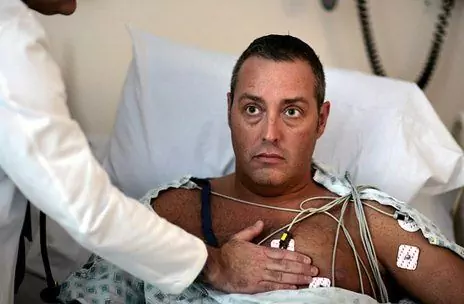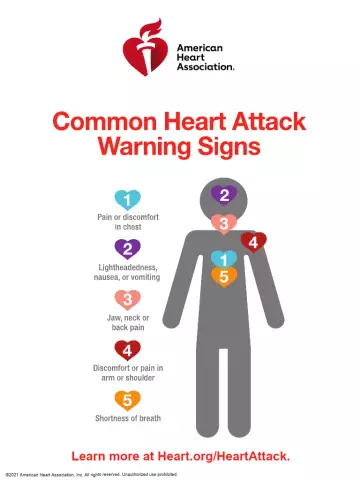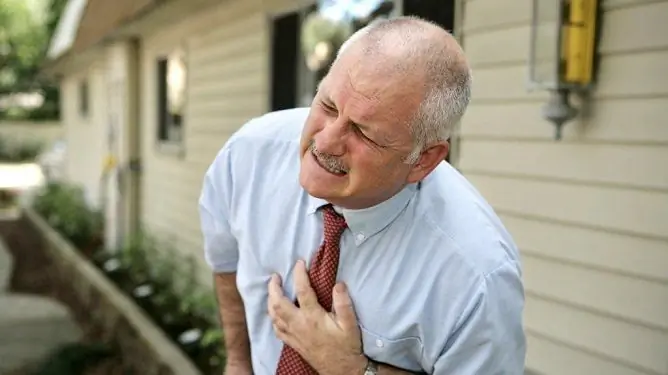- Author Rachel Wainwright wainwright@abchealthonline.com.
- Public 2023-12-15 07:39.
- Last modified 2025-11-02 20:14.
Heart cough: signs, causes, treatment
The content of the article:
- Heart cough - what is it?
- The reasons
- Heart cough symptoms
- Diagnostics
- How to treat a heart cough
- Video
Heart cough is a symptom of many diseases of the cardiovascular system. Despite the fact that it may resemble a cough with bronchitis, it is not associated with pathology of the respiratory tract. If not treated promptly, a heart cough can progress to cardiac asthma or pulmonary edema. These conditions require urgent medical attention to the patient, as they pose a potential threat to life.

Heart cough is a sign of heart disease and requires medical attention.
Heart cough - what is it?
Heart cough is a clinical syndrome resulting from congestion of blood in the lungs. Its development is due to a violation of the contractile activity of the left heart (heart failure).
Patients should understand that cardiac cough is not an independent disease, but just a medical term indicating that a coughing attack is not associated with a pathology of the respiratory system, but is caused by one or another heart disease.
If the left ventricle does not contract effectively enough, it does not have time to pump the entire volume of blood entering it through the pulmonary veins into the aorta (systemic circulation). This promotes stagnation of blood in the vessels of the lungs (in the pulmonary circulation), deterioration of microcirculation processes and increased pressure in the pulmonary vessels, increasing tissue hypoxia.
Due to oxygen starvation, collagen fibers begin to be deposited on the walls of the capillaries and interalveolar septa, which causes the gradual development of pneumosclerosis.
Over time, small vessels in the lungs become overgrown with connective tissue (obliterated). This further impairs the process of blood circulation in the basin of the pulmonary arteries and causes a further increase in pressure in the lungs (pulmonary hypertension), against which the plasma, i.e., the liquid part of the blood, begins to sweat through the walls of the vessels into the surrounding tissues. As a result, the alveoli are compressed and the lumen of the bronchioles is reduced due to edema of the mucous membrane. These changes provoke the onset of coughing.
The body, seeking to reduce the sweating of plasma (transudation), triggers complex reflex reactions aimed at narrowing the small pulmonary vessels. These reactions are called the Kitaev reflex. Thus, the higher the pressure in the pulmonary vessels rises, the stronger the manifestation of the Kitaev reflex. A vicious circle is formed.
The reasons
There are a number of pathologies of the cardiovascular system that can be manifested by the occurrence of a heart cough. These include:
- various forms of coronary heart disease (angina pectoris, myocardial infarction, postinfarction cardiosclerosis);
- arterial hypertension;
- cardiomyopathy;
- myocarditis;
- congenital and acquired heart defects;
- heart rhythm disturbances (arrhythmias);
- diseases of the aorta (mesaortitis, dissecting aneurysm).
Other causes of heart cough include:
- mediastinal pathology;
- hormonal imbalance;
- severe forms of anemia;
- frequent and severe nervous stress;
- smoking;
- abuse of alcoholic beverages;
- taking certain drugs for the treatment of cardiovascular diseases.
A heart cough attack can occur under the influence of:
- increased content of fluid in the patient's body (overhydration) associated with various disorders of water and electrolyte metabolism;
- emotional and physical stress;
- disorders of central nervous regulation;
- increased blood flow into the pulmonary circulation when the patient is in a horizontal position (this is precisely what explains such a sign of a heart cough as its appearance at night).
Heart cough symptoms
A cough can appear against a background of various diseases. An analysis of the patient's complaints makes it possible to understand its origin. So, the manifestations of a heart cough include:
- lack of phlegm (dry cough), but with severe heart failure, sometimes there is a slight coughing up of mucus streaked with blood;
- a coughing attack is combined with a blue discoloration (cyanosis) of the nasolabial triangle, fingertips, earlobes);
- swelling of the neck veins;
- dyspnea;
- palpitations and pains in the heart area (develop due to excessive accumulation of blood in the cavities of the heart);
- a coughing attack can be accompanied by the development of a light-headed state, and in severe cases end in fainting (this symptom is associated with a decrease in cardiac output due to increased chest pressure).

A heart cough may resemble that of a respiratory illness, so an examination is necessary
Initially, the listed symptoms of cough in heart disease are mild and occur under the influence of physical exertion. But as the underlying disease progresses, the cough increases and occurs even with a slight load, for example, with a long conversation.
In the supine position, the left ventricle overflows with blood, which provokes the appearance or intensification of cough. This is typical for both heart disease and bronchial asthma, therefore, when such a symptom appears, the patient must be examined for the purpose of differential diagnosis.
There are also common symptoms of a heart cough:
- dizziness attacks;
- general weakness;
- swelling of the lower extremities.
In addition, for different diseases, heart cough has differences:
- dry and irritating cough - observed at the very beginning of the formation of heart failure, when there are still no phenomena of stagnation in the systemic circulation;
- dry, short, harsh cough - characteristic of rheumatic pericarditis;
- paroxysmal dry cough, combined with shortness of breath - often occurs against the background of mitral stenosis;
- exhausting and loud cough that appears when the patient is in a horizontal position - accompanies chronic left ventricular failure;
- cough with hemoptysis - typical for severe pulmonary congestion caused by right ventricular failure, atrial fibrillation, pulmonary embolism.
Diagnostics
If a patient develops a heart cough, then he should see a doctor for a medical examination aimed at identifying pathology from the cardiovascular system. The standard survey scheme includes:
- plain chest X-ray - for differential diagnosis with respiratory diseases, detection of congestion in the lungs;
- electrocardiography (ECG) - allows you to identify hypertrophy and myocardial ischemia, heart rhythm disturbances;
- echocardiography (Echo-KG) - allows you to study in detail the structures of the heart, to assess the features of the contractile function of the ventricles;
- computed tomography - performed with the aim of a detailed study of the myocardium.
How to treat a heart cough
Cardiac cough, as mentioned above, is just a symptom of a particular pathology of the cardiovascular system, therefore, therapy should be aimed at the underlying disease and prescribed by a cardiologist. It is unacceptable to take any medications without a doctor's prescription, using the advice of friends, as this can lead to unpredictable consequences.

Regular walks in the fresh air can help cope with hypoxia
In addition to drug treatment, the doctor usually recommends a complex of measures to modify the lifestyle for a patient with a heart cough:
- Compliance with the regime of the day. The alternation of work and rest, avoidance of overwork, sleep for at least 8 hours a day - all these conditions have a beneficial effect on the state of the heart muscle.
- Rejection of bad habits. Alcohol and smoking impair metabolic processes in the heart and lungs, so you should stop them as soon as possible.
- Prevention of stress. With pathologies of the heart, stress is a danger to the life of patients, so they are advised to seek help from a psychologist who will teach how to properly resist nervous shocks. If necessary, prescription of tranquilizers or sedatives may be required.
- Walks in the open air. The pathological processes that accompany a cardiac cough always proceed with tissue hypoxia, i.e., their oxygen starvation. Frequent walks in the fresh air, airing the room contribute to the saturation of blood with oxygen, thereby reducing shortness of breath and tachycardia, normalizing sleep, and improving mood.
- Proper nutrition. Patients with a heart cough are advised to exclude strong tea, coffee, salted and smoked foods, fatty and fried foods from the diet. The amount of table salt is limited. In the presence of edema, the daily volume of fluid intake is also limited.
- Physiotherapy exercises. Regular physical activity, taking into account their tolerance and the general condition of the patient, helps to improve the contractile function of the myocardium, to reduce the phenomena of stagnation.
In conclusion, we emphasize once again that a heart cough is often the first sign of serious cardiac diseases. Only a specialist can understand the reasons for its appearance after a thorough examination of the patient. If treatment is not started in a timely manner, heart failure will rapidly and steadily progress, and cardiac cough can turn into cardiac asthma, pulmonary edema.
Video
We offer for viewing a video on the topic of the article.

Elena Minkina Doctor anesthesiologist-resuscitator About the author
Education: graduated from the Tashkent State Medical Institute, specializing in general medicine in 1991. Repeatedly passed refresher courses.
Work experience: anesthesiologist-resuscitator of the city maternity complex, resuscitator of the hemodialysis department.
Found a mistake in the text? Select it and press Ctrl + Enter.






